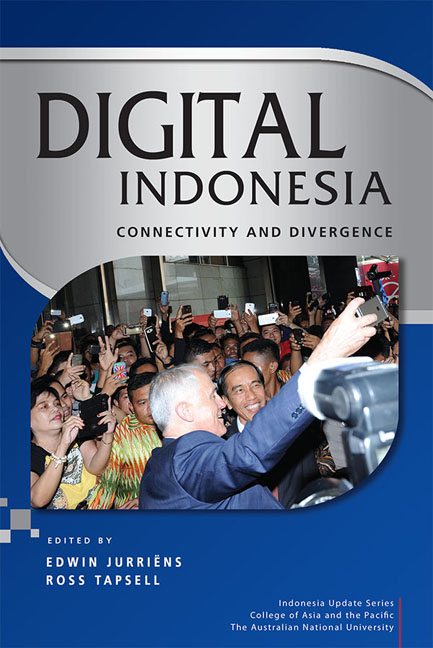Book contents
- Frontmatter
- Contents
- Tables
- Figures
- Contributors
- Acknowledgments
- Glossary
- Map of Indonesia
- 1 Challenges and opportunities of the digital ‘revolution’ in Indonesia
- PART 1 CONNECTIVITY
- PART 2 DIVERGENCE
- PART 3 IDENTITY
- 8 Digital activism in contemporary Indonesia: victims, volunteers and voices
- 9 Social media and Islamic practice: Indonesian ways of being digitally pious
- 10 Online extremism: the advent of encrypted private chat groups
- PART 4 KNOWLEDGE
- PART 5 COMMERCE
- Index
- Indonesia Update Series
8 - Digital activism in contemporary Indonesia: victims, volunteers and voices
from PART 3 - IDENTITY
Published online by Cambridge University Press: 12 January 2018
- Frontmatter
- Contents
- Tables
- Figures
- Contributors
- Acknowledgments
- Glossary
- Map of Indonesia
- 1 Challenges and opportunities of the digital ‘revolution’ in Indonesia
- PART 1 CONNECTIVITY
- PART 2 DIVERGENCE
- PART 3 IDENTITY
- 8 Digital activism in contemporary Indonesia: victims, volunteers and voices
- 9 Social media and Islamic practice: Indonesian ways of being digitally pious
- 10 Online extremism: the advent of encrypted private chat groups
- PART 4 KNOWLEDGE
- PART 5 COMMERCE
- Index
- Indonesia Update Series
Summary
In early 2015 the British comedian John Oliver travelled to Moscow to interview the exiled NSA whistleblower Edward Snowden for a TV show. In the interview, which soon went viral, Oliver reacted to Snowden's laborious attempts to explain the privacy implications of the US government's mass surveillance programs by exclaiming: ‘This is the whole problem. I glaze over. It's like the IT guy comes into your office and you go, “Oh shit—don't teach me anything. I don't want to learn. You smell like canned soup!”’ The comedian then proceeded to ask Snowden a series of questions about the hypothetical fate of shared pictures of his—Oliver's—penis under the NSA's digital surveillance regime. By using his own privates to explain privacy, he succeeded in bringing Snowden's dry discourse to life (whilst extracting comedic value from it).
This hilarious exchange raises three intriguing questions. First, Oliver correctly identifies a fundamental problem at the heart of today's increasingly digitalised power struggles: digital activism ‘nerds’ such as Snowden are often not the best translators of key technical issues for the general public. For this reason, they frequently rely on intermediaries such as journalists, film-makers and even comedians to communicate their political views (Chadwick and Collister 2014). Second, and more problematically, Oliver's gag relies on the lazy popular stereotype of digital activists as young, white, male, Western ‘geeks’ (or hackers). In reality, this is a highly diverse constituency made up of women and men of all ages, races, nationalities and technical abilities, including people with no knowledge of coding or hacking (Postill 2014). Finally, it follows that the expanding transnational space of digital activism epitomised by WikiLeaks, Anonymous, the Electronic Frontier Foundation or Global Voices is itself highly heterogeneous. Therefore, we must differentiate between its various subspaces, or fields, of political action—between digital rights, data activism, social protest or institutional politics, for example (Postill, forthcoming).
In this chapter we take these three observations as our guiding lines. Drawing from recent ethnographic and archival research in Indonesia, we explore how digital activists in that country translate or ‘modulate’ (Kelty 2008) key digital issues—which are sometimes highly technical and abstract—to reach diverse publics, often with remarkable success.
- Type
- Chapter
- Information
- Digital IndonesiaConnectivity and Divergence, pp. 127 - 145Publisher: ISEAS–Yusof Ishak InstitutePrint publication year: 2017



